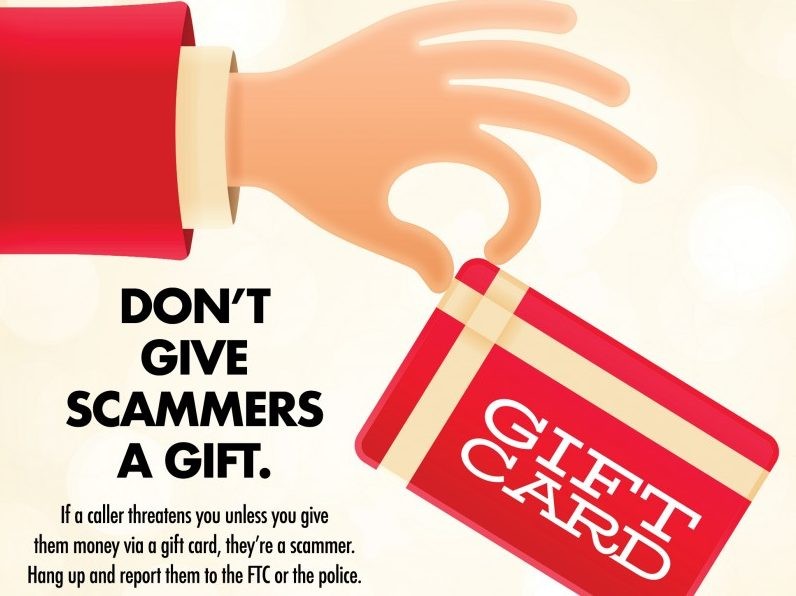For scammers, the season of holiday giving is the season of taking, and Tennesseans’ hard-earned money again tops scammers’ wish lists. Unfortunately, Tennessee consumers are falling for scammers’ ploys when it comes to gift card swindles in increasing numbers. The Federal Trade Commission (FTC)’s Consumer Sentinel Network reports Tennesseans lost nearly $1 million – over $943,000 – through prepaid gift card scams in 2018, which is a 44% increase compared to 2017 when scammers stole $653,709 from consumers.
While family, friends, and co-workers may use gift (or ‘reload’) cards to express holiday appreciation, scammers want the cards’ PIN numbers for fast cash, and they’re willing to do and say anything to get those numbers from consumers.
The Tennessee Department of Commerce and Insurance’s Division of Consumer Affairs (TDCI) is warning consumers of a new and increasingly common scam where callers pretending to represent a federal or state agency contact consumers about a fictitious debt and demand payment in the form of a prepaid gift card or risk punishment. Consumers should remember that no government agency will ever demand payment in the form of a reloadable gift card.
“Gift card scams are growing as thieves learn they can take advantage of unsuspecting and vulnerable consumers,” said TDCI Commissioner Julie Mix McPeak. “I urge consumers to educate themselves in order to fight back against these unscrupulous individuals. If someone calls you demanding payment via a gift card, I urge you to hang up and report the incident to your local law enforcement authorities.”
To help consumers avoid prepaid gift card and other holiday scams, TDCI offers the following tips:
GIFT CARD SCAMS:
· Always remember that a government agency will never ask for payment in the form of a prepaid gift card. If you receive a call from someone portraying him or herself as a government official, but they ask for a gift card as payment, hang up the phone.
· Never read or text someone the PIN number on the back of a gift card. The number is as good as cash in the scammers’ pocket.
· Reputable businesses, like technology support companies and shop-at-home services, don’t ask for gift cards as payment. If you’re being asked by a caller to pay for a product or service with a gift card, proceed with caution because it is likely a scam.
· If you’re buying gift cards as gifts, make sure to buy them from a reputable and known source.
· Always treat gift cards like cash and protect them as you would your wallet.
HOLIDAY SCAMS:
· Be suspicious of apps, online advertisements, or websites offering prices that seem suspiciously lower than retail prices at trusted retailers.
· Consider paying with a credit card that offers fraud protection when possible.
· Only shop on secure websites. Look for https in the address (the extra “s” is for “secure”) and for a lock symbol.
· Some retailers and delivery services need extra help at the holidays, but beware of solicitations that require you to share personal information online or pay for a job lead. Apply in person or go to retailers’ main websites to find out who is hiring.
· Several trusted companies offer charming and personalized letters from Santa, but scammers mimic them to get personal information from unsuspecting parents. Check with https://www.bbb.org/to find out which ones are legitimate.
· Be cautious if you get a call or email from a family member or friend claiming to be in an accident, arrested, or hospitalized while traveling in another country. Never send money unless you confirm with another family member that it’s true.
CHARITABLE GIVING SCAMS:
· Don’t assume that charity recommendations on social media platforms or blogs have already been vetted. Research the charity yourself.
· Find out what percentage of your donation will go to the charity and whether you will be charged any fees for making a donation through a fundraising platform website.
· Check to see if the charity is registered with the Tennessee Secretary of State.
· Websites posing as charities can sometimes look identical to the real organization. These fraudulent websites will often ask for personal or financial information over an unsecure connection or may download harmful malware into your computer. Look for a padlock symbol or “https” before the web address indicating that it is secure.
· Avoid being pressured to make an immediate donation. Don’t hesitate to ask questions to get more information.
· If you didn’t initiate contact, avoid giving personal or financial information over the phone.
· Never write out a check or give cash to an individual solicitor. Write out checks to the name of the organization or use a credit card.
If you’ve been the victim of a gift card or other holiday scam, report it to the FTC.
For more information on being a savvy consumer, visit tn.gov/consumer. You can also check what scams are being reported in your area, the state, and across the country by accessing the Better Business Bureau’s Scam Tracker.
Please join our FREE Newsletter



















